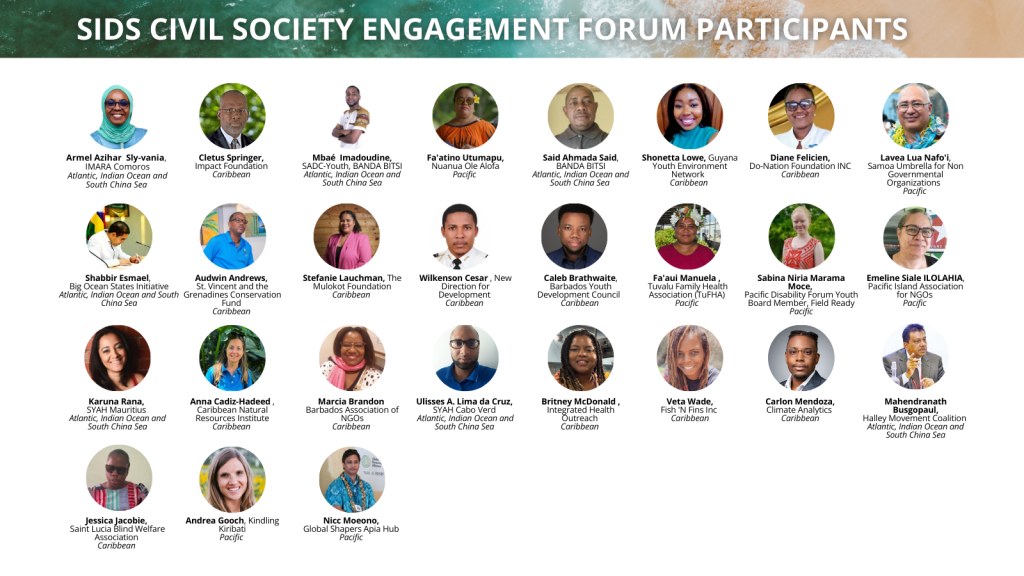Background
On 12–13 May 2025, the Small Island Developing States (SIDS) Civil Society Engagement Forum was held at United Nations Headquarters in New York. Organized by UN DESA in collaboration with the Governments of the Maldives and Latvia – the co-chairs of the Steering Committee on Partnerships for SIDS -, and with generous support from Ireland, the Forum aims to ensure that diverse stakeholder perspectives and needs are fully reflected in the recommendations for strengthening the SIDS Partnership Framework, an outcome from the Fourth International Conference on SIDS.
Established by the United Nations General Assembly in 2015 as part of the SAMOA Pathway, the SIDS Partnership Framework was created to monitor progress on existing partnerships and stimulate the launch of new, genuine, and durable partnerships in support of sustainable development in SIDS.
The Fourth International Conference on SIDS (SIDS4), held from 27 to 30 May 2024 in Antigua and Barbuda, concluded with the adoption of The Antigua and Barbuda Agenda for Small Island Developing States: A Renewed Declaration for Resilient Prosperity (ABAS). Paragraph 37 of ABAS requests the UN Secretary-General, in consultation with Member States and through the Steering Committee on SIDS Partnerships, to present recommendations for strengthening the SIDS Partnership Framework and the SIDS Global Business Network and its Forum.
The SIDS Civil Society Action Plan and Roadmap (2024–2034) - developed by civil society representatives from the Atlantic, Indian Ocean, and South China Sea (AIS), Caribbean, and Pacific regions - outlines a strategic framework for enhancing civil society’s role in implementing the SIDS agenda. It calls for tailored capacity-building, adequate financing, and meaningful inclusion, recognizing the vital contributions civil society makes to sustainable development.
A renewed and strengthened SIDS Partnership Framework can be instrumental in advancing these efforts - fostering partnerships built on trust, transparency, accountability, and collaboration across all sectors of society.
Inputs
- Preliminary Strategies for Enhancing the SIDS Partnership Framework (April 2024): With funding support from the Government of Portugal, UN DESA developed a set of preliminary strategies for enhancing the SIDS Partnership Framework over the coming decade. Study by UN DESA on the SIDS Partnership Framework
Outputs
- Recommendations ABAS para 37
- Civil society from Small Island Developing States takes center stage at Forum to advance partnerships for SIDS4 Agenda
- Civil Society Recommendations for Strengthening the role of Civil Society in ABAS Implementation, including strengthening the SIDS Partnership Framework
- Strengthening Civil Society Engagement and Partnerships for the implementation of the Antigua and Barbuda Agenda
Structure and Format
The SIDS Civil Society Engagement Forum was a two-day meeting designed to facilitate structured dialogue and engagement between civil society and Member States:
- Day 1 – Civil Society Positions: Participants refined key priorities, identify capacity needs, and develop actionable recommendations to enhance civil society engagement in the SIDS Partnership Framework and support ABAS implementation.
- Day 2 – Dialogue with Member States: Civil society representatives presented their recommendations, showcase successful partnerships, and engaged in a focused dialogue with Member States to strengthen multi-stakeholder collaboration in SIDS.
Outcomes
- Enhanced Civil Society Engagement in the SIDS Partnership Framework: Greater integration of civil society perspectives, broader representation, and stronger influence in shaping implementation aligned with the ABAS.
- Strengthened Collaboration between Civil Society and Member States: Improved mutual understanding and cooperation to advance shared priorities for sustainable development in SIDS.
Venue
The Forum took place at UN Headquarters in New York. The first day, 12 May, was held in Conference Room A as a workshop for civil society representatives in SIDS (by invitation only). The second day, 13 May, was held in the ECOSOC Chamber and was be open to all Member States and relevant stakeholders, and broadcast on UN WebTV.
Participants from Civil Society in SIDS

Concept and programme
Watch Day 2 (13 May) live
Messages from Civil Society in SIDS

